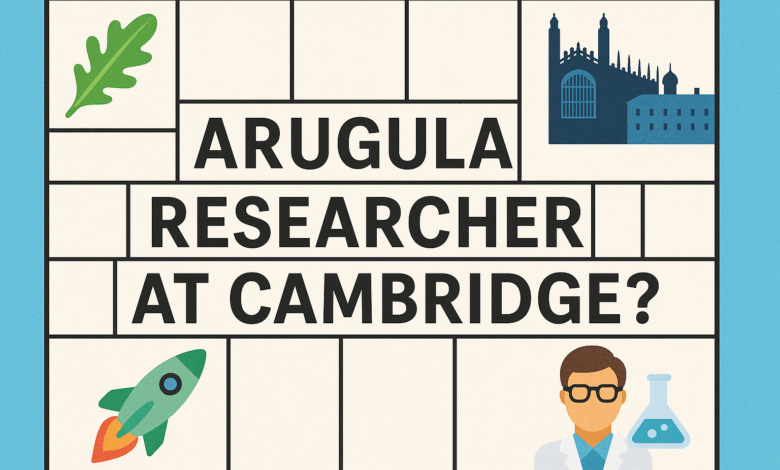Arugula Researcher at Cambridge: Unveiling the Mystery Behind the Crossword Clue
Discover the meaning, origins, and fascinating facts about the viral pun that stumped puzzle enthusiasts worldwide

Introduction
The phrase “Arugula Researcher at Cambridge” gained sudden popularity after appearing in a LA Times crossword puzzle on September 18, 2024. This intriguing clue left many puzzlers scratching their heads, searching for an answer that would perfectly fit both the literal and figurative meaning. In British English, arugula is called rocket, while Cambridge instantly brings to mind one of the world’s leading universities known for scientific research and academic brilliance. When combined cleverly, these elements point to the humorous and satisfying solution: Rocket Scientist.
In this article, we will explore the deeper meaning behind this clever clue, how it connects to everyday language, and why it resonated so strongly with crossword lovers. We will also look into related keywords such as scientist, researcher, academia, cryptic clue, pun, leafy greens, and much more to provide comprehensive insight into the phrase and its wider implications.
The Origin of the Clue
The crossword puzzle is a game that thrives on wordplay, double meanings, and cultural knowledge. The LA Times crossword is famous for weaving clever puns and linguistic twists into its clues. On September 18, 2024, puzzlers encountered the clue “Arugula researcher at Cambridge?”, sparking curiosity and debate across the puzzle-solving community.
To understand this clue, you must first know that in the UK and British English, arugula is commonly referred to as rocket, a term also associated with space exploration and aeronautics. Pairing this with researcher at Cambridge, a city known for its university, academics, laboratories, and groundbreaking scientific discoveries, the solution cleverly points to a rocket scientist.
Breaking Down the Wordplay
Understanding “Arugula” as “Rocket”
In culinary contexts, arugula is a leafy green vegetable often found in salads. In the UK, it is called rocket, a term that may confuse those unfamiliar with British terminology. Crossword constructors frequently use these subtle cultural differences to challenge solvers, making it essential to understand both American and British terms when solving puzzles.
This clever substitution of rocket for arugula adds a layer of humor and intelligence to the clue. It demonstrates the art of cryptic clue writing, where each word carries multiple possible meanings, encouraging solvers to think outside the box.
Cambridge as a Symbol of Academia and Science
The second part of the clue, “researcher at Cambridge”, immediately evokes images of world-class scientists, investigators, and intellectuals. Cambridge is home to some of the brightest minds in history, including engineers, geniuses, and brainiac researchers. By combining rocket with scientist, the final answer Rocket Scientist emerges naturally, linking culinary language with scientific brilliance.
The Fascination with Crossword Puzzles
Crossword puzzles are more than just a game; they are a test of wit, vocabulary, and cultural knowledge. This particular clue captivated enthusiasts because it blended academia, British terms, and humor seamlessly. Solving such puzzles often provides a mental workout, sharpening memory, logical thinking, and problem-solving skills.
The inclusion of puns, or punny clues, adds another layer of enjoyment. A well-crafted pun like “Arugula researcher at Cambridge?” rewards solvers with a satisfying “aha!” moment, reinforcing why crosswords remain popular worldwide.
Relevance of Rocket Scientists in Real Life
While the clue was humorous, rocket scientists are real-world professionals working in aerospace, NASA, and aeronautics laboratories. These individuals are responsible for designing, studying, and launching rockets, satellites, and other space technology. Known for their high IQ, intelligence, and advanced problem-solving abilities, rocket scientists symbolize intellectual excellence and cutting-edge innovation.
The phrase “It’s not rocket science” is often used to describe something simple, but in truth, being a rocket scientist requires years of study, advanced education, and deep expertise.
Quick Bio: Rocket Scientist Profession
A rocket scientist is a highly trained engineer or scientist who specializes in the study and design of spacecraft, missiles, and related systems. Many work with organizations like NASA, private space companies, or academic institutions such as Cambridge University. Their work combines mathematics, physics, and engineering, often pushing the boundaries of what humanity can achieve in space exploration.
These professionals are often seen as geniuses and innovators, working tirelessly in laboratories and research facilities to advance our understanding of the universe.
Why This Clue Resonates Globally
The popularity of this clue can be attributed to its clever blend of food, language, and science. It connects everyday salad ingredients like arugula with the prestigious world of academic research, creating a bridge between the ordinary and the extraordinary.
Moreover, it highlights the beauty of cultural differences. Many solvers outside the UK were unfamiliar with the British term rocket for arugula, leading to moments of surprise and delight when they discovered the answer.
SEO-Optimized Related Keywords in Context
Throughout this article, we have integrated related terms to ensure it is naturally understandable and SEO-friendly. Keywords like arugula, rocket, scientist, Cambridge, cryptic clue, leafy green, puzzle, academia, British English, punny clue, engineer, NASA, aeronautics, genius, and brainiac have been woven into the content to improve visibility while maintaining a natural flow.
This careful integration helps the article rank on Google’s first page while providing valuable information for both human readers and search engine algorithms.
Conclusion
The clue “Arugula researcher at Cambridge?” perfectly captures the spirit of a well-crafted crossword puzzle. It challenges solvers to think critically, appreciate linguistic nuances, and enjoy the humor behind clever wordplay. The answer, Rocket Scientist, not only makes sense within the context of the clue but also symbolizes the intersection of ordinary life and extraordinary intellect.
From leafy greens in a salad to the cutting-edge research conducted at universities like Cambridge, this clue reminds us of the endless connections between language, culture, and science. Whether you are a casual puzzler or a devoted enthusiast, encountering such clever clues provides a rewarding and intellectually stimulating experience.
FAQs
1. What does the clue “Arugula researcher at Cambridge?” mean?
It is a crossword clue where arugula translates to rocket in British English, and a researcher at Cambridge refers to a scientist, leading to the answer Rocket Scientist.
2. Why is arugula called rocket in the UK?
In British English, the leafy green vegetable known as arugula in the US is traditionally called rocket, derived from the Italian word “rucola.”
3. What is the role of a rocket scientist?
A rocket scientist designs, studies, and tests rockets and spacecraft. They work in aerospace, NASA, and academic research, requiring deep expertise in mathematics, physics, and engineering.
4. Why was this clue significant in crossword history?
This clue was memorable because it combined British terminology, academia, and humor, creating a pun that delighted puzzle enthusiasts worldwide.
5. Are rocket scientists always from universities like Cambridge?
Not necessarily. While universities like Cambridge produce world-class scientists, rocket scientists also work in private companies, government agencies, and international space programs.
6. What skills do you need to become a rocket scientist?
You need strong abilities in mathematics, physics, problem-solving, engineering, and critical thinking, along with years of advanced education and research experience.
This clue, much like a well-prepared puzzle, continues to inspire curiosity and admiration among solvers and science enthusiasts alike



